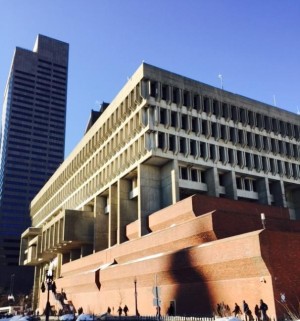After months of waiting, Boston city councilors took a swift and unanimous vote Wednesday afternoon to approve eight of Mayor Michelle Wu’s nominations to the city’s powerful Zoning Board of Appeal.
The vote is both a victory for Wu’s attempt to remake the ZBA with her development priorities in mind and could unstick slowed approvals process for development projects in Massachusetts’ largest city.
The vote came nearly three months after Wu first named a slate of primary and alternate members to fill out numerous seats on the 14-member board that, thanks to Boston’s antiquated zoning ordinances, must hear most small- and mid-sized development proposals, particularly housing projects.
The reason for the delay was unclear; the council’s Planning, Development and Transportation Committee only held a hearing on the appointees on Monday.
“Thank you to the City Council for confirming these new members, who will play a crucial role in our work to build more housing and address the regional affordability crisis, support equitable and resilient neighborhoods, and shift to planning-led development,” Wu said in a statement. “These board members represent the diversity, talent, and expertise of our communities to ensure Boston’s growth helps address our greatest challenges.”
Thanks in part to Wu’s own efforts as a city councilor to obstruct former mayor Marty Walsh’s appointments to the ZBA, the body was operating short-handed, and all members’ terms had technically expired.
This, as acting ZBA chair Mark Erlich told Banker & Tradesman recently, made it challenging for the board to achieve a quorum, palpably slowing the process of approving new developments.
Given the board’s vast power to dispense exemptions to the city’s zoning code, widely agreed as obsolete, and the lack of a city-wide rezoning, the ZBA will become a principal field on which Wu’s real estate policy priorities like turning the city away from car-centric development and towards more affordable housing development will play out.
“We are eager to work alongside Boston’s Zoning Board of Appeals to help shape the residential and commercial future of Boston,” Greg Vasil, CEO of the Greater Boston Real Estate Board, said in a statement. “GBREB’s nominees, Jeanne Pinado and Katie Whewell, are incredibly qualified professionals who we know will do a superb job representing the real estate industry. We look forward to following their work, and the work of the Board at-large.”
Little tension over Wu’s nominees was evident at Monday’s hearing.
East Boston Councilor Gabrielle Colletta quizzed each about their willingness to “hold the line” and not grant “self-created” financial hardship variances to developers once the neighborhood was rezoned following the conclusion of the Boston Planning & Development Agency’s PLAN: East Boston initiative. Most nominees replied that they would be skeptical of financial hardship variances after a rezoning, although some noted that such variances can play a role when construction costs spiral out of control, as they have in recent years.
Back Bay and Fenway Councilor Kenzie Bok probed nominees about whether they’d be open to regular briefings on policy efforts and changes at the BPDA or in other parts of city government.
And Dorchester Councilor Frank Baker, who chairs the committee, asked several of Wu’s nominees if they were “pro-development” or “cautious” about development, but largely did not press them on the topic, and did not express overt concerns about any nominee’s answers.
The members confirmed by the council Wednesday were:
- At-large: Giovanni Valencia, director of community organizing for Jamaica Plain Neighborhood Development Corp.
- Nominated by neighborhood organizations: Norm Stembridge, Roxbury Strategic Master Plan Oversight Committee co-chair (primary seat); Sherry Dong, Tufts Medicine senior director of community benefits and health equity (primary seat); and Shavel’le Olivier, Mattapan Food and Fitness Coalition executive director (alternate seat).
- Nominated by the GBREB: Katie Whewell, Newton Planning Department planning staffer (alternate seat).
- Nominated by the Boston Society for Architecture: Hansy Better Barraza, Studio Luz principal and co-founder (primary seat).
- Nominated by the Building Trades Council: Alan Langham of Dorchester (primary seat) and Dave Collins of Roslindale (alternate seat).
Dong and Better Barraza are being reappointed to their seats.
The city council had previously approved the appointment of Building Trades Employers Association nominee and New England Regional Council of Carpenters business representative Raheem Shepherd, who will hold a primary seat, and David Aiken, a senior project manager at The Community Builders, holder of an alternate seat and a nominee of the city’s neighborhood organizations.
The council’s actions Wednesday still leave a handful of Wu’s appointees still waiting for their required hearings and votes, but substantially fill out the ZBA’s roster.
GBAR nominee and Colliers Executive Vice President Jeanne Pinado, BSA nominee and DREAM Collaborative senior project architect Thea Massouh and Alaa Mukahhal, a transportation planner at Kittleson & Assoc., still await confirmation.
This story has been updated to add comment from Boston Mayor Michelle Wu and GBREB CEO Greg Vasil.







